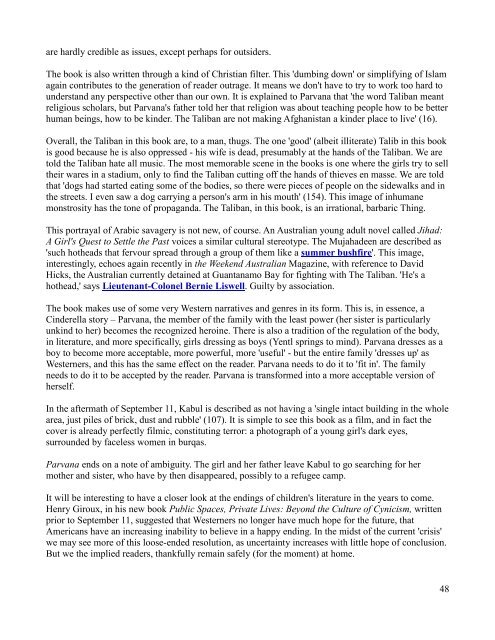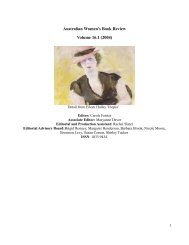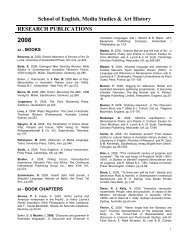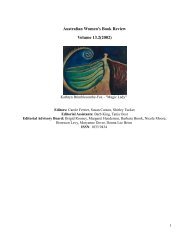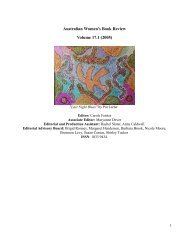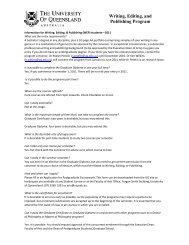Australian Women's Book Review Volume 14.1 - School of English ...
Australian Women's Book Review Volume 14.1 - School of English ...
Australian Women's Book Review Volume 14.1 - School of English ...
You also want an ePaper? Increase the reach of your titles
YUMPU automatically turns print PDFs into web optimized ePapers that Google loves.
are hardly credible as issues, except perhaps for outsiders.<br />
The book is also written through a kind <strong>of</strong> Christian filter. This 'dumbing down' or simplifying <strong>of</strong> Islam<br />
again contributes to the generation <strong>of</strong> reader outrage. It means we don't have to try to work too hard to<br />
understand any perspective other than our own. It is explained to Parvana that 'the word Taliban meant<br />
religious scholars, but Parvana's father told her that religion was about teaching people how to be better<br />
human beings, how to be kinder. The Taliban are not making Afghanistan a kinder place to live' (16).<br />
Overall, the Taliban in this book are, to a man, thugs. The one 'good' (albeit illiterate) Talib in this book<br />
is good because he is also oppressed - his wife is dead, presumably at the hands <strong>of</strong> the Taliban. We are<br />
told the Taliban hate all music. The most memorable scene in the books is one where the girls try to sell<br />
their wares in a stadium, only to find the Taliban cutting <strong>of</strong>f the hands <strong>of</strong> thieves en masse. We are told<br />
that 'dogs had started eating some <strong>of</strong> the bodies, so there were pieces <strong>of</strong> people on the sidewalks and in<br />
the streets. I even saw a dog carrying a person's arm in his mouth' (154). This image <strong>of</strong> inhumane<br />
monstrosity has the tone <strong>of</strong> propaganda. The Taliban, in this book, is an irrational, barbaric Thing.<br />
This portrayal <strong>of</strong> Arabic savagery is not new, <strong>of</strong> course. An <strong>Australian</strong> young adult novel called Jihad:<br />
A Girl's Quest to Settle the Past voices a similar cultural stereotype. The Mujahadeen are described as<br />
'such hotheads that fervour spread through a group <strong>of</strong> them like a summer bushfire'. This image,<br />
interestingly, echoes again recently in the Weekend <strong>Australian</strong> Magazine, with reference to David<br />
Hicks, the <strong>Australian</strong> currently detained at Guantanamo Bay for fighting with The Taliban. 'He's a<br />
hothead,' says Lieutenant-Colonel Bernie Liswell. Guilty by association.<br />
The book makes use <strong>of</strong> some very Western narratives and genres in its form. This is, in essence, a<br />
Cinderella story – Parvana, the member <strong>of</strong> the family with the least power (her sister is particularly<br />
unkind to her) becomes the recognized heroine. There is also a tradition <strong>of</strong> the regulation <strong>of</strong> the body,<br />
in literature, and more specifically, girls dressing as boys (Yentl springs to mind). Parvana dresses as a<br />
boy to become more acceptable, more powerful, more 'useful' - but the entire family 'dresses up' as<br />
Westerners, and this has the same effect on the reader. Parvana needs to do it to 'fit in'. The family<br />
needs to do it to be accepted by the reader. Parvana is transformed into a more acceptable version <strong>of</strong><br />
herself.<br />
In the aftermath <strong>of</strong> September 11, Kabul is described as not having a 'single intact building in the whole<br />
area, just piles <strong>of</strong> brick, dust and rubble' (107). It is simple to see this book as a film, and in fact the<br />
cover is already perfectly filmic, constituting terror: a photograph <strong>of</strong> a young girl's dark eyes,<br />
surrounded by faceless women in burqas.<br />
Parvana ends on a note <strong>of</strong> ambiguity. The girl and her father leave Kabul to go searching for her<br />
mother and sister, who have by then disappeared, possibly to a refugee camp.<br />
It will be interesting to have a closer look at the endings <strong>of</strong> children's literature in the years to come.<br />
Henry Giroux, in his new book Public Spaces, Private Lives: Beyond the Culture <strong>of</strong> Cynicism, written<br />
prior to September 11, suggested that Westerners no longer have much hope for the future, that<br />
Americans have an increasing inability to believe in a happy ending. In the midst <strong>of</strong> the current 'crisis'<br />
we may see more <strong>of</strong> this loose-ended resolution, as uncertainty increases with little hope <strong>of</strong> conclusion.<br />
But we the implied readers, thankfully remain safely (for the moment) at home.<br />
48


